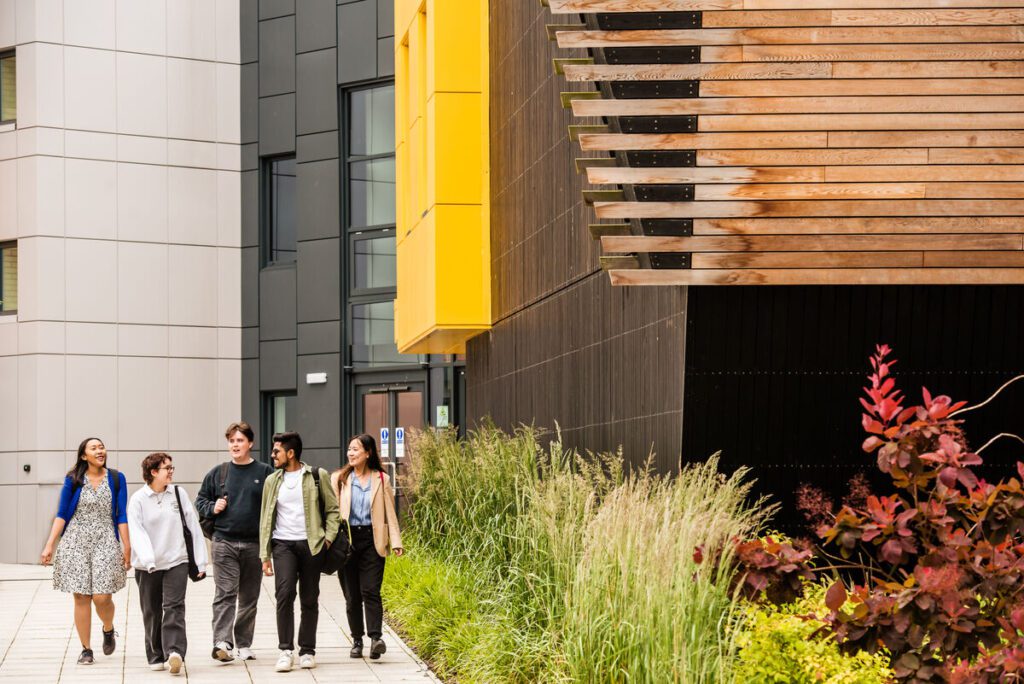From extreme weather and rising sea levels to breakthroughs in artificial intelligence and vaccine development, the world is changing fast. Climate change affects food security. AI raises questions about ethics and employment. Global pandemics expose cracks in healthcare systems, and international conflicts continue to reshape borders and alliances.
Lancaster University’s School of Global Affairs has designed a set of programmes to empower students to confront the defining issues of this generation, which are deeply connected across multiple domains, from the climate crisis to AI, healthcare, international relations, and more.
It’s a mind-expanding, career-boosting education, thanks to the school’s close work with organisations that are actively shaping global outcomes. From international agencies and governments to charities, think tanks and businesses, these partnerships ensure that you engage with the realities of change-making in today’s world. The school itself is a key contributor; its research regularly contributes to national and international policy, making it a voice in global debates.

Lancaster University’s three global leadership programmes combine expert-led master’s learning with cross-cohort leadership development. Source: Lancaster University
Master’s programmes that transform students into change makers
The school offers three interdisciplinary, one-year master’s degrees: Artificial Intelligence, Society and Global Challenges MA, Global Medical and Health Humanities MA, and Sustainability and Global Environmental Futures MA. Each programme explores a key global issue while offering space to understand how it connects with others.
This is made possible through a shared programme structure. You’ll dive deep into your subject through specialist modules, while also coming together across programmes for joint classes. These cross-programme modules focus on leadership and collaboration, helping you see the overlaps between climate, technology, health and global politics.
For example, the Artificial Intelligence, Society and Global Challenges MA investigates how AI is transforming the world and what that means for individuals and communities. Through this programme, you’ll analyse how intelligent machines have captured the human imagination while exploring AI’s practical applications across sectors. Subject-specific modules provide in-depth knowledge of AI technology, ethics, and global issues, whilst studio modules let you learn via live briefs and collaboration.
The programme combines insights from the arts, humanities, and social sciences as well, helping you understand more perspectives and unpack the complexities of AI’s impact beyond its conventional confines. You’ll also work with peers from other master’s programmes, including sustainability and health.
“Our global leadership MA programmes are designed so that students across the programmes can learn from each other’s developing expertise in these areas, develop transferable skills, and the ability to work in multidisciplinary teams,” says Dr Joe Lindley, faculty member.

At Lancaster University, sophisticated, interdisciplinary collaboration empowers leaders to reach consensus and develop effective, sustainable solutions to global challenges. Source: Lancaster University
The MA in Global Medical and Health Humanities gives a current and fresh perspective on healthcare by combining global challenges with insights from the humanities. You’ll examine topics such as inequality, illness, well-being, and medical systems using approaches from history, sociology, film, politics, and other disciplines.
At the heart of the programme is the core module, Navigating Global Medical and Health Humanities. It’s designed to help students explore different perspectives and define their own focus within the field. The programme also encourages work alongside peers researching AI and the environment, two areas that are increasingly shaping the future of healthcare.
“In my own work on histories, cultures and philosophies of the hospital, for instance, I am seeing more and more how the question of sustainability is at the forefront of future hospital design, and how technology, digital infrastructure and AI are also opening exciting opportunities for imagining healthcare futures,” says Dr. Benjamin Dalton, the programme lead.
The MA in Sustainability and Global Environmental Futures is designed for those who want to start shaping real solutions to the climate crisis. The programme starts by exploring the complex relationship between people and the planet. Drawing on the arts, humanities, social sciences, and natural sciences, you’ll then acquire practical tools to understand the diverse interests, both human and non-human, that shape our environmental future.
The programme allows you to look at a diverse range of issues that are part of the climate crisis, from conflicts to inequality, through scientific, legal, educational, and policy lenses.
It’s this expansive approach that will appeal to professionals from a wide range of industries.
“We’ve been struck by the interest of prospective students who currently work in the oil and gas extraction industries,” says Professor Deborah Sutton, who co-developed the programme. “We hope that, as graduates from our MA programme, they will be able to understand the social and environmental effects of fossil-fuel industries from a number of perspectives.”
These master’s programmes are designed for students who want to build careers that make a difference, whether in the public or private sector, in the UK or internationally. Each programme focuses on major global challenges and prepares students for roles where fresh thinking and practical solutions are in demand.
Applications are now open for October 2025 entry. With options to study full- or part-time, you can choose a path that fits your goals while gaining the skills to lead in a fast-changing world.
Apply to Lancaster’s School of Global Affairs today.
Follow the School of Global Affairs at Lancaster University on Facebook, Instagram, YouTube, and TikTok

